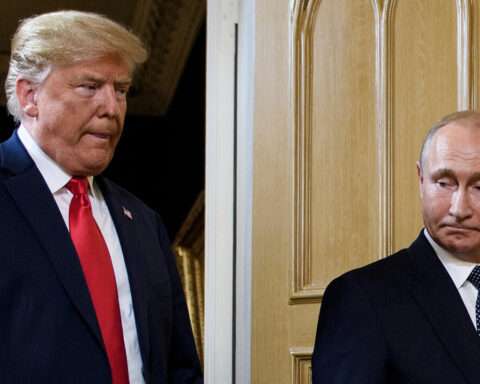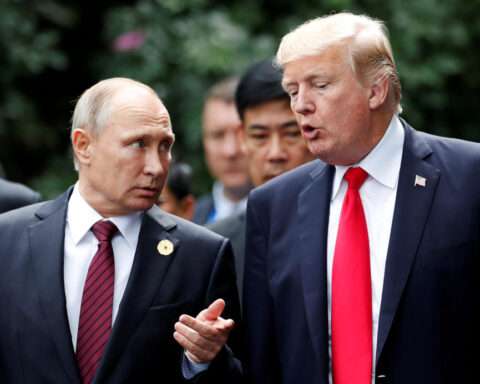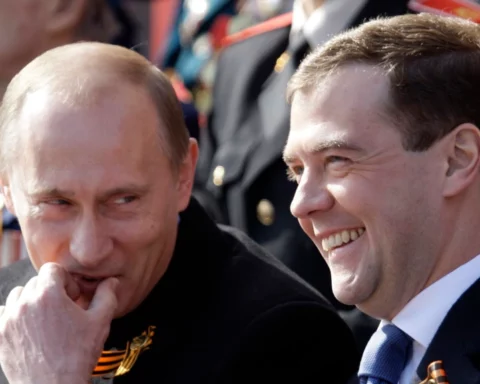As Vladimir Putin’s political star rose, journalist Anatoly Levin-Utkin was a key researcher behind one of the first Russian media reports digging into the former KGB officer’s past. Then he was beaten to death.
In the late summer of 1998, Russian journalist Anatoly Levin-Utkin was returning to his St. Petersburg apartment after a long day at the startup newspaper he’d helped launch. He made it as far as the elevator before his attackers pounced.
The assailants smashed the journalist’s skull with a metal bar and fled the scene with Levin-Utkin’s documents, cash, and a briefcase carrying material for his newspaper’s next issue.
Levin-Utkin was taken to the hospital after a neighbor found him unconscious next to the elevator. The doctors who tried to save him said his attackers “deliberately beat him to death with excessive brutality and cruelty,” his colleagues would later write.
Levin-Utkin died four days later, on August 24, 1998. He had turned 41 a week earlier.
Publicly, police said the deadly attack appeared most likely to be a robbery. But Levin-Utkin’s colleagues at Yuridichesky Peterburg segodnya (Legal Petersburg Today) linked it to his profession.
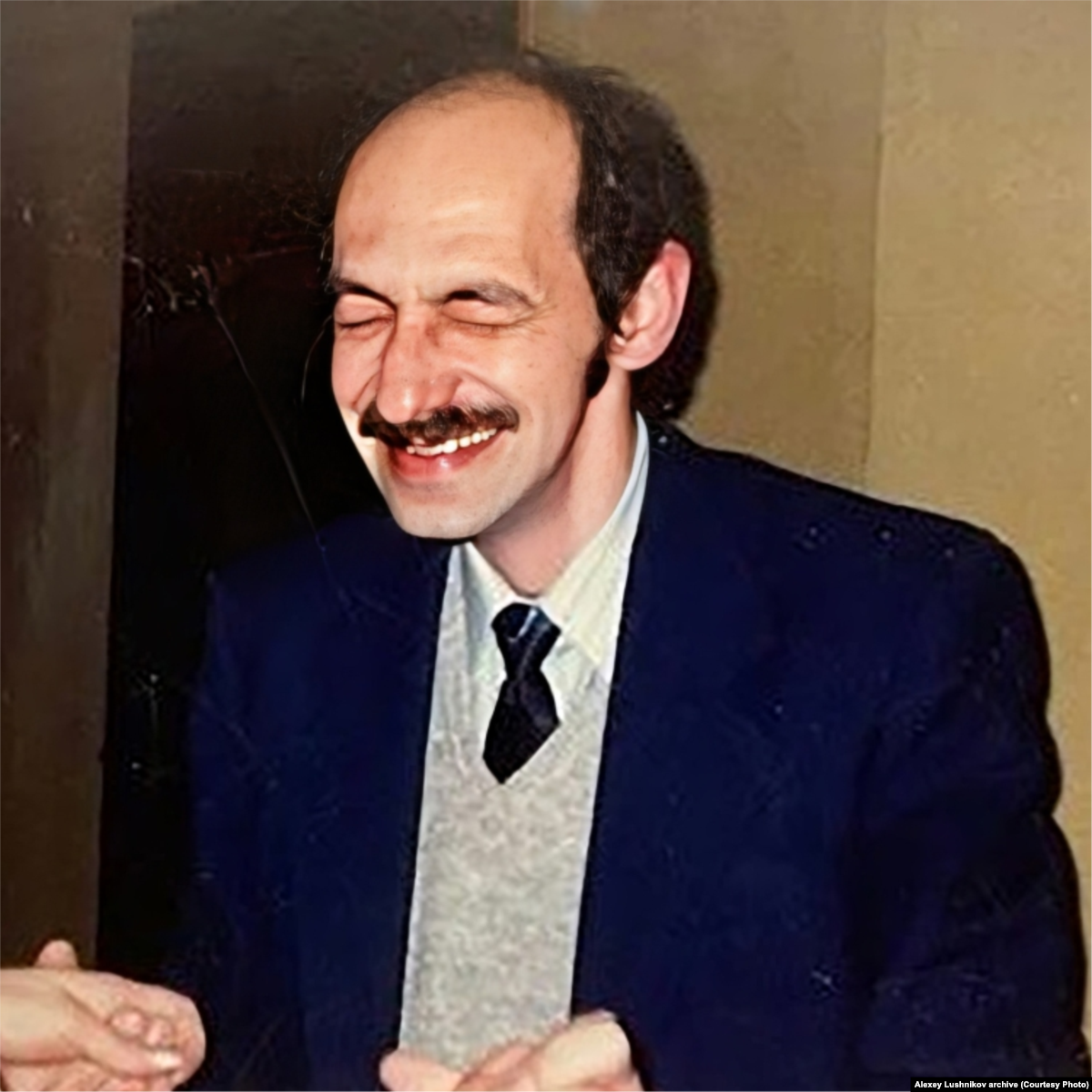
Levin-Utkin had worked closely with the reporters at the newspaper “and was one of the first to be aware of all the scandals,” Editor in Chief Aleksei Domnin told a news conference after his deputy editor’s death.
Just eight days before the attack, the newspaper had published its second issue, which included sensitive investigations into the regional customs directorate and Russia’s cutthroat banking sector.
Levin-Utkin’s colleagues say he was a phenomenal and dogged open-source researcher in an era before massive caches of public data and user-generated images were available to journalists online.
“Tolya had connections in [the National Library of Russia in St. Petersburg],” Domnin recalled, using a diminutive form of Levin-Utkin’s first name. “He was a bibliophile who collected an enormous home library.”
This report is the fifth and final installment of aninvestigative project examining the scandals and scams that swirled around Vladimir Putin and his associates during his tenure as a St. Petersburg city official in the 1990s.
According to Domnin, Levin-Utkin himself did not write the more explosive articles in the paper’s final issues before his death, though he contributed critical research and reporting. After publication, the paper fielded angry calls from the customs service and “not very bright people” from bank security staff trying to figure out where the information for the investigations came from, Domnin said.
There was another article Levin-Utkin worked on, Domnin added, that was published in his final issue and that also drew outside attention: a dive into the past of the newly appointed head of Russia’s Federal Security Service (FSB), an ex-KGB-spy-turned-functionary named Vladimir Putin.
‘As Befits A Spy’
On July 25, 1998, Russian President Boris Yeltsin named Putin as the new head of the FSB. For Putin, who had come to work in Yeltsin’s administration in 1996 after a six-year tenure at St. Petersburg city hall, it was a homecoming of sorts.
“I started as a junior agent…in the St. Petersburg [KGB] directorate. That was 23 years ago or so. I repeat, these walls are home to me,” Putin told a news conference following his appointment.
As the head of St. Petersburg’s External Relations Committee under Mayor Anatoly Sobchak, Putin was an influential local official whose involvement in lucrative and murky deals drew scrutiny from local lawmakers, who at one point called for his ouster.

But outside of Russia’s tsarist-era capital, Putin was virtually unknown to the broader public. And his appointment to the country’s most powerful security post left journalists scrambling to dig up information on a man whose professional life had for years largely been devoted to misdirection and subterfuge.
It was Levin-Utkin’s newspaper, in Putin’s hometown, that offered readers one of the first profiles in the Russian print media to draw on deep digging into little-known aspects of his time as a city official in St. Petersburg.
Under the headline “Lieutenant Colonel Putin Illegally Heads Up FSB,” the article delves into Putin’s personal and professional ties with regional and national political figures, including his mentor, Sobchak; Yeltsin’s former chief of staff and first deputy prime minister, Anatoly Chubais; and former Prime Minister Viktor Cherdomyrdin, head of the Our Home Is Russia party, whose regional campaign in St. Petersburg was led by Putin in the 1995 parliamentary elections.
“Since his recent appointment, journalists have been trying to dig up more information about the past of the new Lubyanka [FSB headquarters] boss. It turned out that Putin has left neither good nor bad memories about himself: Very little is known about his career aside from the official information. As befits a spy, he doesn’t have a single major scandal on his record. Still, a few facts about his work in St. Petersburg have managed to be ‘declassified,'” the article states.
The article features no bombshell revelations about Putin. In fact, parts of it appear to have been plagiarized from a shorter piece published by the Moscow daily Kommersant two weeks earlier.
But the profile of Putin published in Levin-Utkin’s paper does touch on areas and claims unaddressed in the Kommersant piece, including the inquiry by St. Petersburg lawmaker Marina Salye into Putin’s suspicious barter deals as head of the External Relations Committee that led Salye to call for his firing.
The profile, published under the pseudonymous byline “A. Kirilenko,” concluded with the questionable claim that Putin’s appointment as FSB director violated the agency’s internal staffing policy. It cited an alleged internal requirement that the position can only be filled by someone with the rank of general, while Putin had never risen higher than the rank of lieutenant colonel. (Russian law governing the FSB states that the director is appointed by the president and makes no mention of rank requirements.)
Domnin, the editor in chief of Yuridichesky Peterburg segodnya, told RFE/RL that Levin-Utkin did not write the profile but was among those who contributed research to it.
“I sent all of the newspaper’s employees to the libraries” to search for information, Domnin recalled in a telephone interview.
He also claimed that, after it was published, an associate of Putin’s approached him and inquired about how the paper was financing its operations.
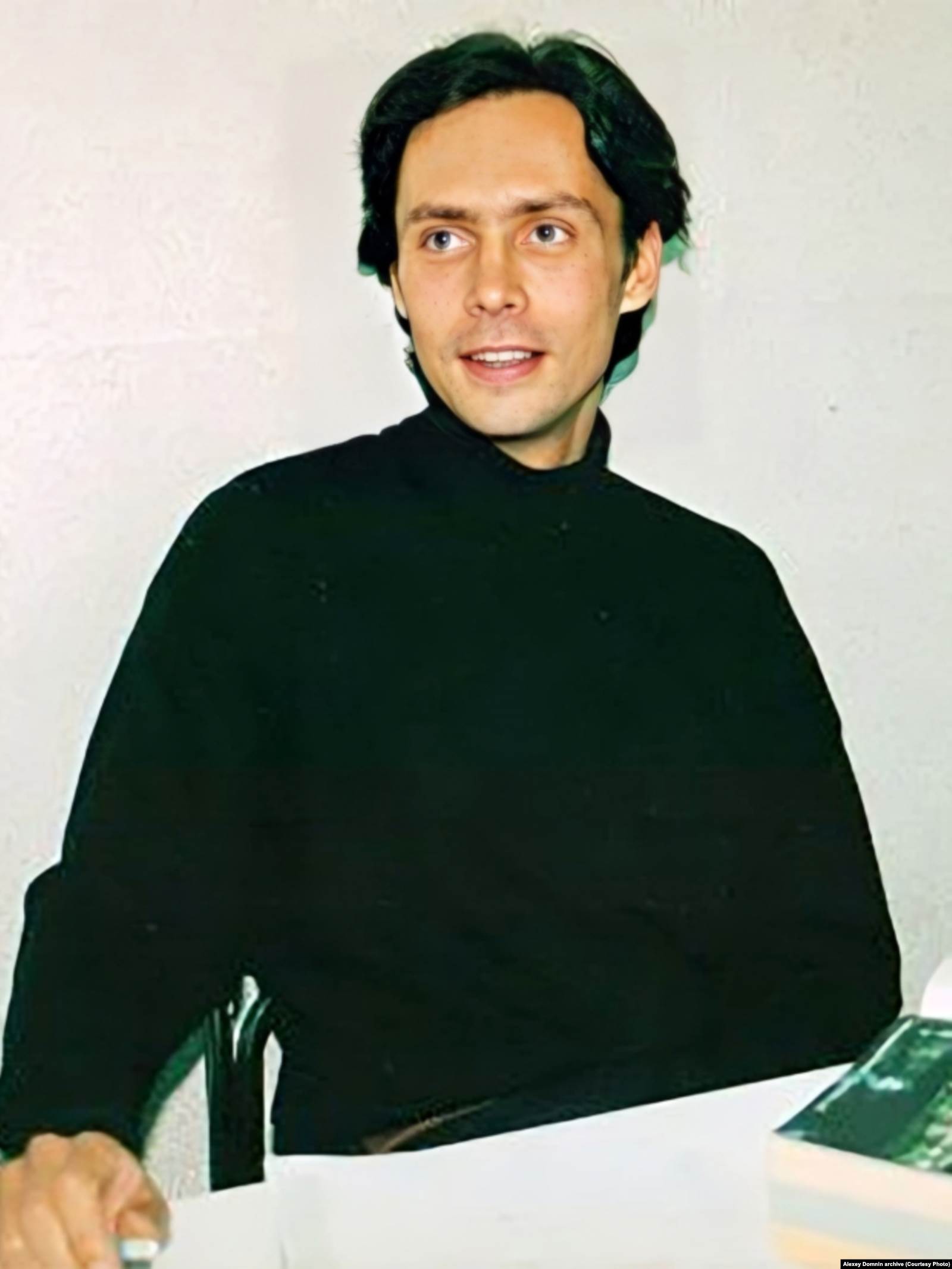
Domnin gave the name of this alleged intermediary, a St. Petersburg political strategist who had worked with the St. Petersburg operations of Our Home Is Russia, whose regional campaign in 1995 had been spearheaded by Putin. He said the two men met at the McDonald’s on St. Petersburg’s central Sennaya Square.
“His first words were: ‘Why did you publish such a bad photo of Putin? If you’d called me, I would have given you a good one,'” Domnin recalled about the alleged meeting.
Reached by RFE/RL, the political strategist denied knowing Domnin or being familiar with the profile of Putin that Levin-Utkin worked on.
RFE/RL is not identifying the man by name because it could not independently corroborate Domnin’s account of the alleged meeting with the political strategist, who does not appear to have any current links to Putin or the Kremlin.
‘Encyclopedic Knowledge’
Information about Levin-Utkin is virtually nonexistent online beyond a handful of contemporaneous articles about the attack that led to his death and brief snapshots in lists the media watchdogs maintain on the dozens of Russian journalists who have been killed since the collapse of the Soviet Union in 1991.
But those who worked with him described Levin-Utkin as a bookish, kind, and cautious man and the archetype of a member of St. Petersburg’s intelligentsia.
“He was always searching for a grain of rationality. He was a very soft-spoken and knowledgeable person. It often seemed to me that he had encyclopedic knowledge,” Aleksei Lushnikov, who owned a St. Petersburg media holding where Levin-Utkin worked, told RFE/RL.
Before embarking on a career in journalism, Levin-Utkin had worked at a factory producing leather sofas, Lushnikov said.
“I still remember his tales about leather sofas: how they are made, what kinds of leather there are. Tolya knew almost everything about all of this. Tolya was always sitting in bookshops,” Lushnikov said.
Domnin said Levin-Utkin began working in the media in 1993. “They killed a professional journalist,” he told RFE/RL.
In an obituary published a month after Levin-Utkin’s death, his colleagues wrote that their fallen colleague “made no enemies in his 41 years of life.”
“We are confident that he simply didn’t have any,” they wrote. “He managed to preserve his childlike spontaneity in his relationship to people and to life in general. We loved him, as one can only love very good, wonderful people.”

1 / 2The obituary of Anatoly Levin-Utkin published in Yuridichesky Peterburg segodnya a month after his death.
‘Deliberately Killed’
Nearly a quarter of a century after Levin-Utkin was beaten to death, the crime remains unsolved, like numerous other fatal attacks on journalists in post-Soviet Russia.
“For me it was completely incomprehensible precisely because Tolya was a cautious person,” Lushnikov, the media executive who employed Levin-Utkin, told RFE/RL. “How could he become a victim?”
In a newsletter shortly after Levin-Utkin’s death, the Glasnost Defense Foundation, a Russian media watchdog, quoted a doctor who treated him following the attack as saying that “the nature of the injuries allow us to state that the journalist was deliberately killed.”
The newsletter also quoted a St. Petersburg police precinct chief as saying that “as of now there is no confirmation that the attack on Anatoly Levin-Utkin was connected to his professional activities.”
“Police are inclined to believe that this case involved a routine robbery,” Sergei Kukshtel, chief of the 59th precinct, was quoted as saying in the newsletter.
Domnin, however, told RFE/RL that investigators appeared more interested in a different possible motive when he was questioned at a local police station.
“They were particularly interested in the professional motive,” he said.
Domnin said he was questioned twice in connection with the crime — once at the paper’s office on the day after the attack, and once at a police precinct in St. Petersburg’s Primorsky district, though the crime was committed in the city’s Vyborgsky district. Domnin said the men who questioned him at the police station did not even keep a record of the interview, and that he believes they were likely FSB officers rather than police.
St. Petersburg police did not respond to an inquiry about the status of the investigation of Levin-Utkin’s killing.
Yuridichesky Peterburg segodnya managed to put out four more issues after Levin-Utkin’s killing — six in total — before it was shut down in the wake of the Russian government’s default, which coincided with Levin-Utkin’s 41st birthday on August 17, 1998, and came three days before his fatal attack.
Domnin left the media industry in 2007 and now works as a musician and DJ.
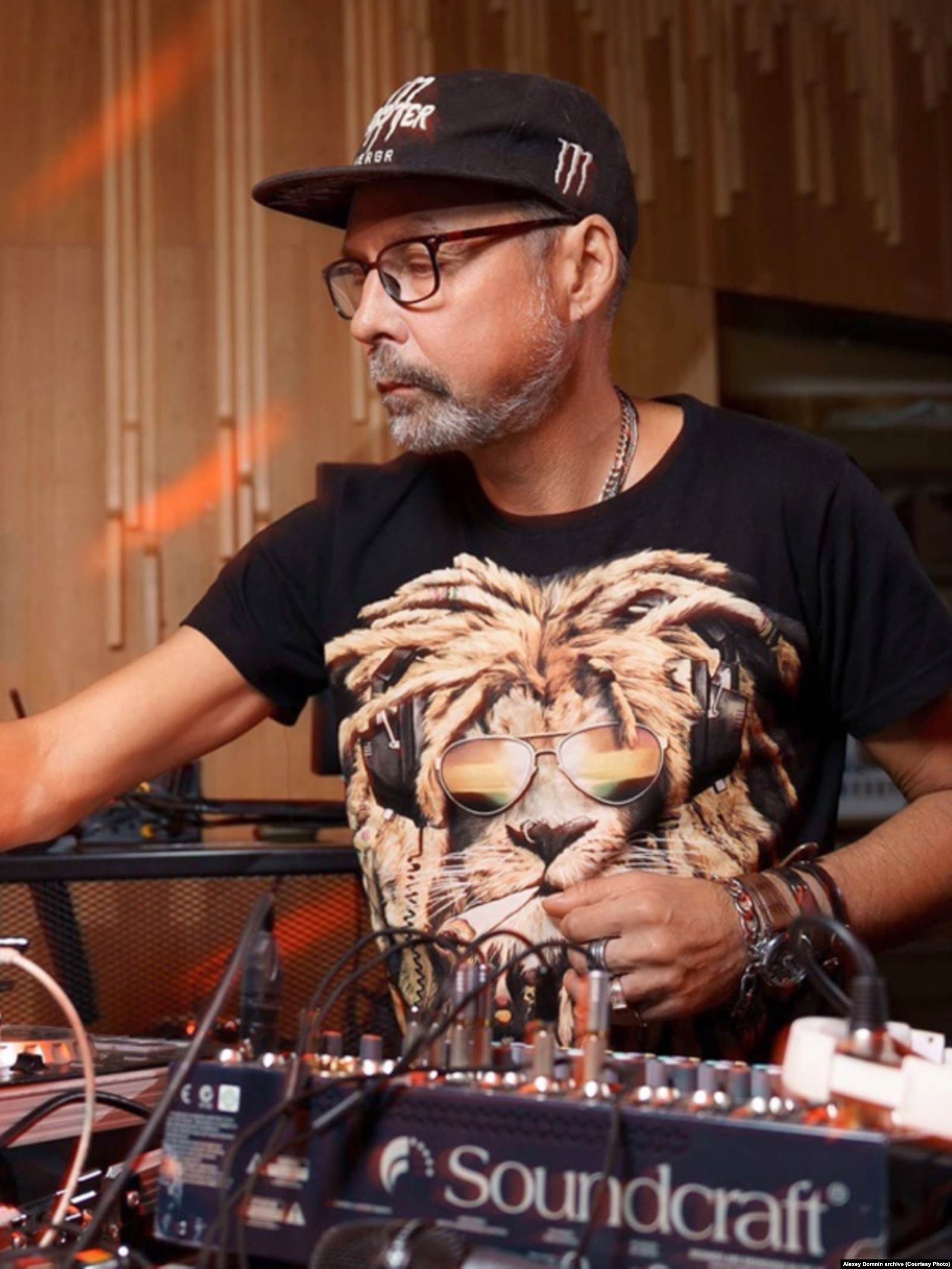
Levin-Utkin was survived by his wife, who declined to speak with RFE/RL when reached by telephone. Despite the contemporaneous statements by police, media watchdogs, and Levin-Utkin’s colleagues about his work for Yuridichesky Peterburg segodnya, his widow claimed that he never worked for the newspaper. Follow-up calls for clarification about this claim went unanswered.
Levin-Utkin’s widow to this day lives in the same apartment where the couple resided 24 years ago, in the building where he was fatally beaten on his way home from work.
RFE/RL is publishing below an English translation of the profile of Vladimir Putin that Anatoly Levin-Utkin worked on shortly before his fatal beating. RFE/RL has added hyperlinks and images for background on the events and individuals cited in the text.
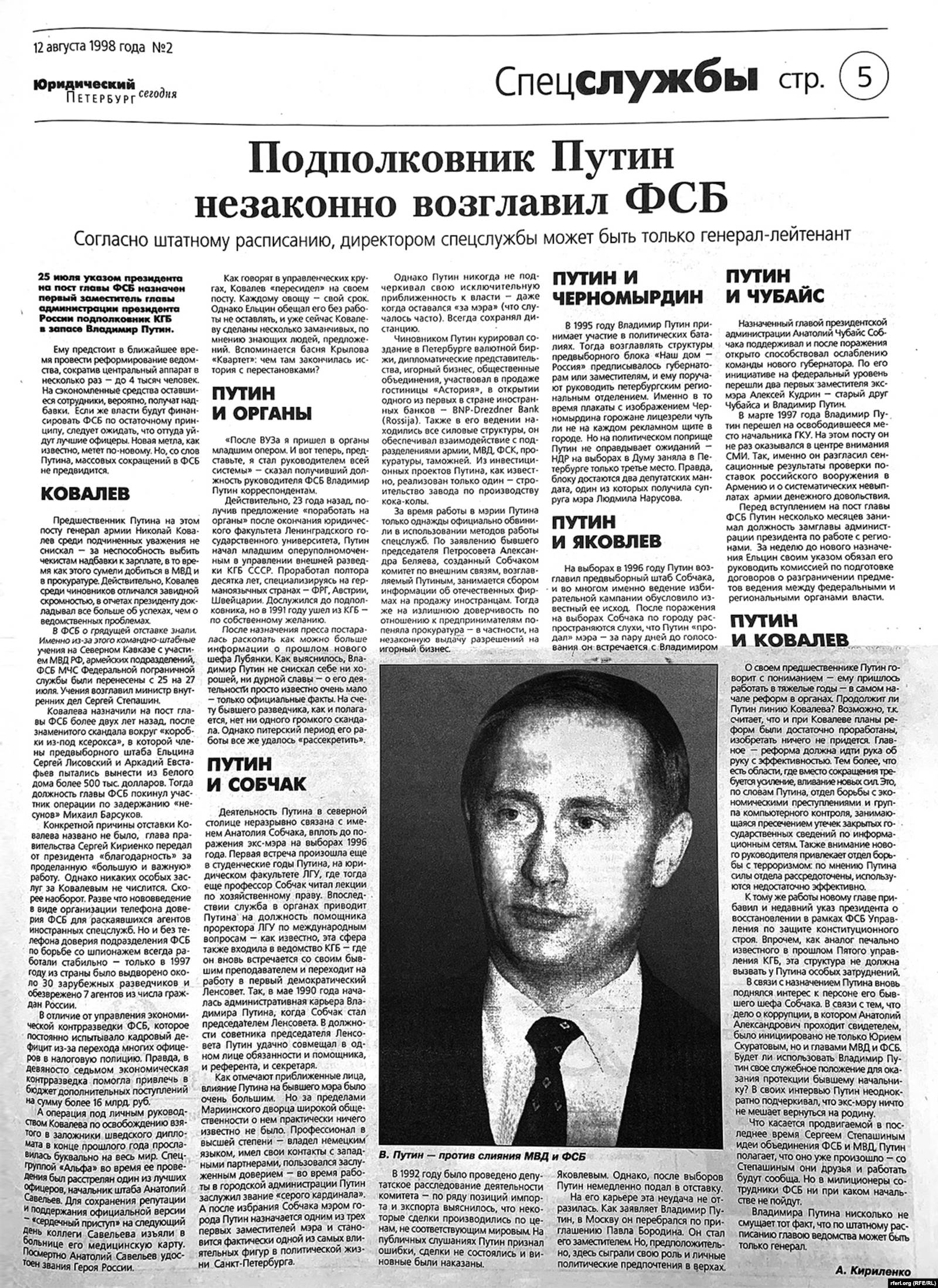
Lieutenant Colonel Putin Illegally Heads Up FSB
According to staffing structure, the director of the security service must be a lieutenant general.
On July 25, the first deputy of the presidential administration, retired KGB Lieutenant Colonel Vladimir Putin, was appointed director of the FSB by presidential decree.
He has been assigned to reform the agency in the short term, reducing its central staff several times over to 4,000 officers. The funds saved by this will allow for salary increases for the remaining staff. If the FSB is financed by the residual model, its best officers are likely to leave. As they say, a new broom sweeps clean. However, Putin has declared that there will be no massive reduction of FSB staff.
Kovalyov
Putin’s predecessor, army General Nikolai Kovalyov, was not particularly popular with his subordinates after he proved unable to secure salary increases, something the heads of the Interior Ministry and the Prosecutor-General’s Office succeeded in doing. Indeed, Kovalyov was notably shy for a high-ranking officer and preferred to report about the successes of his agency than its problems.
Within the FSB, his dismissal had been expected. That was the reason for the postponement of the staff exercises in the North Caucasus — which involved the Interior Ministry, army units, the FSB, the Emergency Situations Ministry, and the Federal Border Service — from July 25 to July 27. Interior Minister Sergei Stepashin was the commander of the exercises.
Kovalyov was appointed head of the FSB more than two years ago, following the famous scandal with the “Xerox box” that was used by the members of Yeltsin’s election campaign staff Sergei Lisovsky and Arkady Yevstafyev as they tried to take more than $500,000 from the White House [Russian government headquarters]. FSB head Mikhail Barsukov, who was involved in their detention, soon left his post.
No specific reason was given for Kovalyov’s dismissal. Prime Minister Sergei Kiriyenko conveyed the president’s “gratitude” for the “big and important” work he had done. However, Kovalyov isn’t known for any significant achievements. Quite the opposite. His only success was in setting up an FSB hotline for repenting agents of foreign intelligence services. But even without a hotline, the FSB had always worked steadily in its counterintelligence operations: In 1997 alone, 30 foreign intelligence officers were expelled from Russia, and seven Russian citizens working for foreign intelligence were neutralized.
[These successes] were not matched by the FSB’s economic counterintelligence department, which was constantly understaffed due to the transfer of many of its officers to the tax police. In 1997, however, economic counterintelligence helped to increase state budget revenues by more than 16 billion rubles.
A special operation under Kovalyov’s personal command to free a Swedish diplomat taken hostage late last year gained worldwide fame. During the operation, the Alfa special forces group shot one of its top officers, chief of staff, Anatoly Savelyev. To preserve the group’s reputation and support the officially declared cause of death as a “heart attack,” Savelyev’s colleagues removed his medical records from the hospital the next day. Anatoly Savelyev was posthumously awarded the title Hero of Russia.
In executive circles, they said Kovalyov had “stayed in his post too long.” Everything is good in its season. Yeltsin, however, promised him another job, and Kovalyov has received a few lucrative job offers, according to those in the know. It recalls one of Krylov’s fables, The Quartet: What was the result of all the reshuffles there?
Putin And The Security Apparatus
“After university, I started working as a junior investigator. Now — imagine that — I have become the director of the whole system,” Vladimir Putin told journalists when he took up the post.
Indeed, 23 years ago, Putin accepted an offer to work for the security services after he graduated from the law department of Leningrad State University. He started as a junior investigator at the KGB Directorate of Foreign Intelligence. He worked there for 15 years, specializing in German-speaking countries: West Germany, Austria, and Switzerland. He eventually rose to the rank of lieutenant colonel but resigned from the KGB voluntarily in 1991.
Since his recent appointment, journalists have been trying to dig up more information about the past of the new Lubyanka [FSB headquarters] boss. It turned out that Putin has left neither good nor bad memories about himself: Very little is known about his career besides the official facts. As befits a spy, he doesn’t have a single major scandal on his record. Still, a few facts about his work in St. Petersburg have managed to be “declassified.”
Putin and Sobchak
Putin’s career in St. Petersburg was inextricably linked to Anatoly Sobchak, right up until the former mayor lost the 1996 elections.
They first met when Putin was studying law at Leningrad State University, where Sobchak lectured on commercial law. Later, Putin’s experience in the security services helped him become vice rector for international relations at Leningrad State University (this area of operation had been monitored by the KGB), where he met his former professor and soon took a post in Leningrad’s first democratic city council. Putin’s administrative career began in May 1990, when Sobchak became chairman of the council. As his aide, Putin managed to be his assistant, desk officer, and secretary all at once.

According to those who knew them, Putin had significant influence on the former mayor. But outside the Mariinsky Palace, the general public knew practically nothing about him. An experienced professional — he spoke German, had contacts with Western partners, and earned trust — Putin had the reputation of a power broker during his work in the city administration. After Sobchak was elected mayor of St. Petersburg, Putin became one of his three deputies and, in fact, one of the most influential political figures in the city.
But Putin never emphasized his exceptional proximity to power, not even when he served as acting mayor (which happened often). He always kept his distance.
Putin the bureaucrat oversaw the establishment of the currency exchange in St. Petersburg, diplomatic offices, the gambling industry, and nongovernmental organizations; he brokered the sale of the Astoria hotel and the opening of one of Russia’s first foreign bank offices, BNP-Dresdner Bank (Rossija). He also coordinated all security services: army, police, counterintelligence, prosecutor’s office, and customs. Only one of his foreign-investment projects was implemented: a Coca-Cola production facility was built.
During his tenure at the mayor’s office, Putin was officially accused of using the methods of secret services only once. According to the former chairman of the St. Petersburg city council, Aleksandr Belyayev, the External Relations Committee established by Sobchak and headed by Putin was collecting information on Russian companies to be sold to foreign owners. At the same time, the prosecutor’s office reproved Putin for being too gullible and issuing illegal gambling licenses.
In 1992, a [city] parliamentary investigation of the committee’s activities was conducted with regard to several import and export deals. It revealed that some of the deals were made at prices that did not correspond to world prices. Putin admitted errors during public hearings, the deals were called off, and no one was punished.
Putin and Chernomyrdin
In 1995, Putin took part in a political campaign. At the time, governors or their deputies were expected to run the regional offices of the [pro-Yeltsin] Our Home Is Russia party. Putin became the head of its St. Petersburg office. Residents of the city could see posters of [Viktor] Chernomyrdin on almost every billboard in the city. But Putin didn’t live up to the expectations: Our Home Is Russia took only third place in the parliamentary election in St. Petersburg, securing two seats (the mayor’s wife, Lyudmila Narusova, took one of them).

Putin And Yakovlev
Putin was the head of Sobchak’s campaign in the 1996 election, and in many respects the way the campaign was conducted determined its result. After Sobchak lost, there were rumors circulating in the city that Putin had “sold out” his boss at a meeting with his rival, Vladimir Yakovlev, a couple of days before the election. However, Putin resigned immediately after the election.

This failure didn’t stop his career. According to Putin, he came to Moscow at the invitation of Pavel Borodin and became his deputy. But presumably the personal political preferences of powerful figures also played a role here.
Putin And Chubais
The head of the presidential administration, Anatoly Chubais, had supported Sobchak and, after his defeat, tried to weaken the new governor’s team. It was his initiative to invite two former first deputy mayors into the federal government: Chubais’s old friend Aleksei Kudrin, and Vladimir Putin.
In March 1997, Vladimir Putin took the vacant post of the head of the Government Accountability Office. He often grabbed headlines in this capacity: It was Putin who disclosed the sensational results of the inspection of arms sales to Armenia and systematic delays in army salary payments.

For a few months before becoming the director of the FSB, Putin served as a deputy head of the presidential administration, where he was responsible for regional policy. A week before the new appointment, Yeltsin commissioned him to prepare papers on the demarcation of jurisdiction between federal and regional authorities.
Putin And Kovalyov
Putin has spoken about his predecessor with sympathy: [Kovalyov] worked in the agency during the tough early years of the reforms. Will Putin follow Kovalyov’s policies? It’s possible because he believes Kovalyov’s reform plans were sufficiently developed, so there’s no need to invent anything. The main thing is that reforms should increase the efficiency of the agency. Some sectors require expansion rather than cuts. According to Putin, that is the case with the department of economic crimes and the computer control group that prevents leaks of classified information to the Internet. The new head puts special focus on counterterrorism operations: In Putin’s opinion, these forces need to be less dispersed and more effective.

Besides, a recent presidential decree has tasked the new FSB head with restoring the department of protection of the constitutional order. However, it’s similar to the KGB’s infamous Fifth Directorate [responsible for crackdowns on dissidents in the U.S.S.R.], so that shouldn’t be a tough challenge for Putin.
In the wake of Putin’s appointment, there has been a lot of interest in his former boss, Sobchak. He is a witness in a corruption case launched not only by Yury Skuratov, but also by the heads of the Interior Ministry and the FSB. Will Vladimir Putin use his position to protect his former boss? Putin has repeated in his interviews that the former mayor has nothing to fear should he decide to return to Russia.
As for the idea of uniting the FSB and the Interior Ministry, which has been recently promoted by Sergei Stepashin, Putin believes that it has already happened — he and Stepashin are friends and will be working together. But no FSB officers will ever become police officers.
Vladimir Putin is not worried in the least by the fact that, according to staffing policies, only a general can be head of the [FSB].
A. Kirilenko



